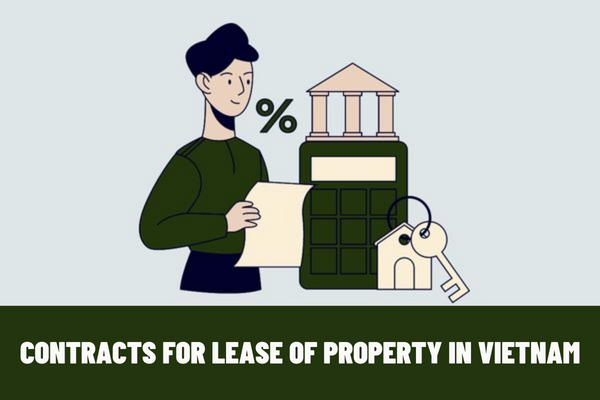What are contracts for lease of property in Vietnam? What are the regulations on liability to compensate for damage in contracts for lease of property in Vietnam?
What are contracts for lease of property in Vietnam?
Pursuant to Article 472 of the 2015 Civil Code of Vietnam on contracts for lease of property as follows:
Contracts for lease of property
Contract for lease of property means an agreement between parties whereby a lessor delivers property to a lessee for use during a fixed term and the lessee is required to pay rent.
Lease contracts of houses or lease contracts of houses for other purposes shall comply with this Code, the Law on Housing and relevant laws.
Thus, contract for lease of property means an agreement between parties whereby a lessor delivers property to a lessee for use during a fixed term and the lessee is required to pay rent.
What are contracts for lease of property in Vietnam? What are the regulations on liability to compensate for damage in contracts for lease of property in Vietnam?
How must the lease property be returned?
Regarding the return of leased property, it is prescribed in Article 482 of the 2015 Civil Code of Vietnam, specifically:
Return of leased property
1. A lessee must return leased property in the same condition in which it was received, normal wear and tear excepted, or in the condition agreed. If the value of the leased property has decreased in comparison with its condition at the time it was received, the lessor has the right to demand compensation for any damage, normal wear and tear excepted.
2. Where leased property is moveable property, the place for returning the leased property shall be the place of residence or head office of the lessor, unless otherwise agreed.
3. Where leased property is livestock, the lessee must return both the leased livestock and any offspring born during the term of the lease, unless otherwise agreed. The lessor must reimburse the lessee for expenses incurred in caring for the offspring.
4. Where a lessee is late in returning leased property, the lessor has the right to require the lessee to return the leased property and to pay rent for the period of delay and the lessee must compensate for damage. The lessee must pay a penalty for the late return of the leased property if so agreed.
5. The lessee must bear the risk in relation to the leased property during the period of delay.
Thus, in case the lessee causes damage to the leased property, the aggrieved person has the right to request the lessee to compensate for the damage to the damaged part of the damaged property.
Liability to compensate for damage in contracts for lease of property in Vietnam?
Pursuant to Article 584 of the 2015 Civil Code of Vietnam, the grounds giving rise to liability to compensate for damage are as follows:
Grounds giving rise to liability to compensate for damage
1. A person intentionally or unintentionally harming the life, health, honor, dignity, reputation, property, or other legal rights or interests of a person, must compensate for such damage, unless otherwise prescribed in this Code or relevant laws.
2. The person who causes damage shall be discharged from liability for compensation in case where the damage incurs due to force majeure events or at entire fault of the aggrieved person, unless otherwise agreed or otherwise prescribed by law.
3. If a property causes damage, its owner or possessor must compensate for the damage, except for the damage prescribed in Clause 2 of this Article.
In addition, the principles of compensation for damage is specified in Article 585 of the 2015 Civil Code of Vietnam, specifically as follows:
Principles of compensation for damage
1. Actual damage must be compensated in full and promptly. Unless otherwise provided by law, parties may agree on the amount of compensation; on the form of compensation, which may be money, in kind or the performance of an act; lump sum payment or payment in instalments; and on the method of compensation.
2. The compensation payable by a person having caused damage may be reduced if such damage was caused unintentionally and is very large in comparison to the financial positions of such person.
3. If the amount of compensation determined becomes unrealistic, the aggrieved person, or the person having caused damage, has the right to request a court or another competent authority to change the amount of compensation.
4. If the aggrieved party is partly his/her fault for causing the damage, that part of damage shall not be compensated.
5. The party having rights and interests infringed shall not be compensated if such damage incurs due to his/her failure to adopt necessary measures to prevent the damage.
Thus, when damage occurs, the person possessing the property must be responsible for compensating for the damage in full and promptly. The parties may agree on the amount of compensation; on the form of compensation, which may be money, in kind or the performance of an act; lump sum payment or payment in instalments; and on the method of compensation.
LawNet